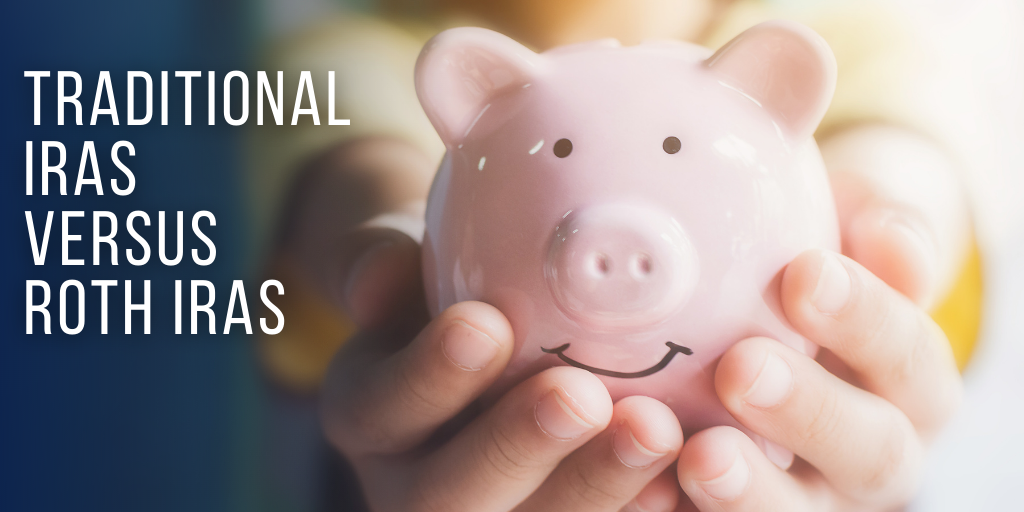Traditional IRAs versus Roth IRAs
Submitted by Neville Associates on May 24th, 2021
Understanding the contribution, age, and income rules in 2021
Currently, there are two popular Individual Retirement Accounts (IRAs) vying for your attention: the traditional IRA and the Roth IRA. While both are long-term savings vehicles with tax benefits, each has different rules concerning contributions, age, and income that may change from one year to the next.
Contributions
Perhaps the biggest difference between traditional IRAs and Roth IRAs is how and when taxes apply to the contributions and earnings. Contributions to traditional IRAs can be pre-tax (deductible on the taxpayer’s income tax return).
Although contributions and earnings accumulate on a tax-deferred basis, income taxes are due when IRA distributions are taken. On the other hand, contributions to Roth IRAs are made with after-tax dollars, and contributions and earnings accumulate tax free. No income tax is due when distributions are taken from a Roth IRA. For tax year 2021, the maximum contribution to either a traditional IRA or Roth IRA is $6,000 ($7,000 for individuals age 50 or older).
Age Restrictions
Contributions to traditional IRAs may be made at any age. Required minimum distributions (RMDs) must begin by April 1 of the year after an individual reaches age 70½ (or a considerable tax penalty may apply). However, changes were made by the Setting Every Community Up for Retirement Enhancement (SECURE) Act and, due to these changes, if your 70th birthday is July 1, 2019 or later, you do not have to take withdrawals until you reach age 72.
Roth IRAs have neither an age limit for contributions nor minimum distribution requirements. However, both traditional and Roth IRAs have a minimum age for distributions: 59½. Distributions taken prior to age 59½ may be subject to a 10% Federal income tax penalty. Certain situations qualify as exemptions, such as distributions to pay first-time-homebuyer expenses or qualified education expenses. Furthermore, before tax-free distributions can be received from a Roth IRA, the account must be five years old.
Income Eligibility Limits
Depending on your tax-filing status, your income, and whether or not you participate in a qualified employer-sponsored retirement plan, you may be eligible to take an income tax deduction for contributions to a traditional IRA.
If you are a single taxpayer, do not participate in a qualified employer-sponsored plan, and earn a minimum of $6,000, contributions are deductible regardless of your adjusted gross income (AGI). However, if you do participate in an employer-sponsored retirement plan, income limits apply. Deductions in 2021 phase out for single filers with modified AGIs (MAGIs) between $66,000 and $76,000, and for married couple joint filers with MAGIs between $105,000 and $125,000.
The income eligibility requirements are different for Roth IRAs. If you participate in a qualified employer-sponsored retirement plan, you may contribute to a Roth IRA; however, if you are also contributing to a traditional IRA, your contributions may not exceed the annual contribution limits. You are eligible to make a full contribution to a Roth IRA if your MAGI in 2021 does not exceed $125,000 for single filers or $198,000 for married joint filers (contributions phase out for single filers with MAGIs between $125,000 and $140,000, and for married joint filers with MAGIs between $198,000 and $210,000). For a married individual filing separately who participates in a workplace retirement plan, the phase-out range is $1 to $10,000.
A Roth IRA is often a favored choice for those who participate in a qualified employer-sponsored retirement plan and exceed the income limits for a deductible IRA, but who meet the income eligibility requirements for a Roth IRA.
Analyze This
As you investigate which IRA – or combination of IRAs – offers you the best bottom line, you may want to consider the following questions:
- What tax benefits, current and long-term, are available to you?
- When do you anticipate needing your IRA proceeds?
An analysis of your personal financial situation and retirement objectives with a qualified financial professional can help you develop a financial strategy to meet your specific needs. Scrutinizing the details now may save you time and money in the future.
Important Disclosures
The opinions voiced in this material are for general information only and are not intended to provide specific advice or recommendations for any individual security. To determine which investment(s) may be appropriate for you, consult your financial professional prior to investing.
This information is not intended to be a substitute for specific individualized tax advice. We suggest that you discuss your specific tax issues with a qualified tax advisor.
Contributions to a traditional IRA may be tax deductible in the contribution year, with current income tax due at withdrawal. Withdrawals prior to age 59 ½ may result in a 10% IRS penalty tax in addition to current income tax.
The Roth IRA offers tax deferral on any earnings in the account. Withdrawals from the account may be tax free, as long as they are considered qualified. Limitations and restrictions may apply. Withdrawals prior to age 59 ½ or prior to the account being opened for 5 years, whichever is later, may result in a 10% IRS penalty tax. Future tax laws can change at any time and may impact the benefits of Roth IRAs. Their tax treatment may change.
This article was prepared by FMeX.
LPL Tracking 1-05117226
REV_03.02.2021

